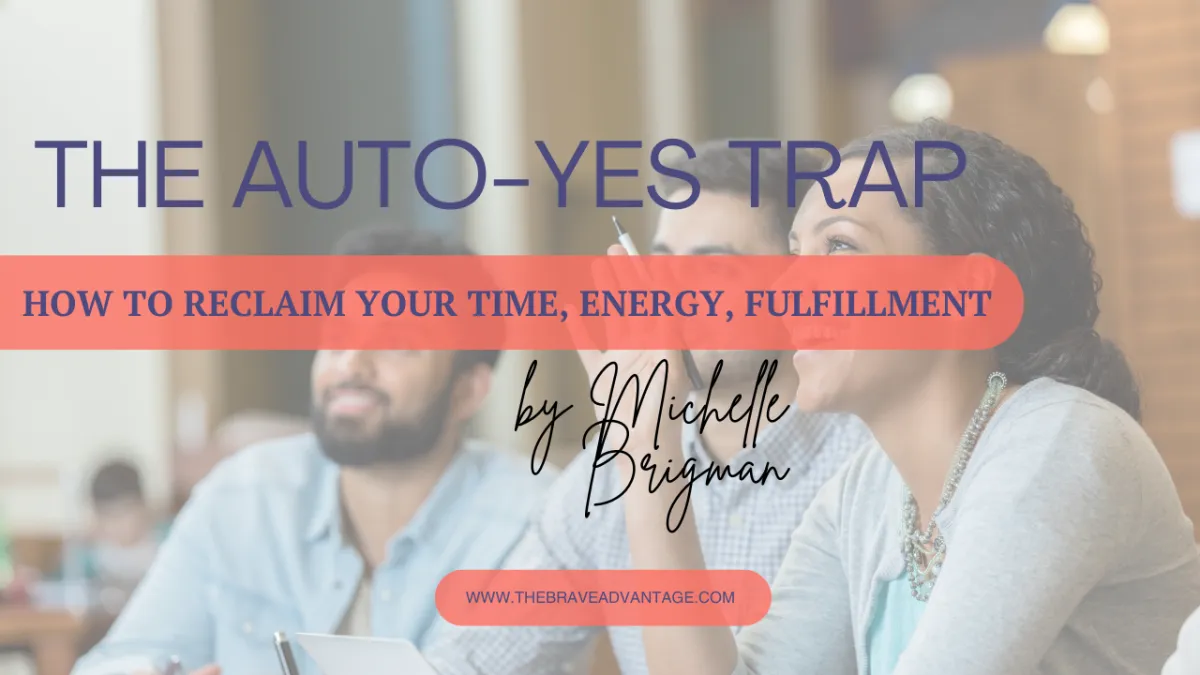
The Real Cost of the Automatic “Yes”
The Auto-Yes Trap: How High-Achieving Women Can Reclaim Their Time, Energy, and Fulfillment
Saying “Yes” on Autopilot? It’s Costing You More Than You Think...
How many times have you agreed to something before even realizing what you were committing to? A late-day Slack ping, a casual “Can you take a look at this tonight?”—and suddenly your fingers are typing “Of course!” without hesitation.
If this sounds familiar, you’re not alone. For many high-achieving women, saying yes is a reflex—not a choice. And while it might seem helpful in the moment, it’s often a slow leak on your energy, your priorities, and your fulfillment.
Why This Pattern is So Common—And So Draining
We’ve been conditioned to say yes. From childhood through corporate leadership, women are rewarded for being agreeable, helpful, and dependable. According to LeanIn.org, 63% of professional women feel pressured not to let others down, even at the expense of their own well-being.
But here’s the hidden cost:
Every unintentional yes subtracts energy from your priorities
It leads to resentment, burnout, and decreased effectiveness
It reinforces a cycle where your value is tied to being “on call”
Even neuroscience backs it up: when overwhelmed, your brain defaults to unconscious decisions—which is why the "auto-yes" feels so hard to break.
The Real Cost of the Automatic “Yes”
Here’s what truly shifted my mindset: understanding that each yes has a cost.
1. Decision Fatigue Depletes Your Focus
Each yes drains your mental clarity. Research shows that the more choices you make in a day, the weaker your decision-making power becomes.
2. Quality Suffers When You Say Yes to Everything
Being overcommitted dulls your creative edge and impact. When your attention is divided, you can’t bring your best to what matters most.
3. Resentment Creeps In
That silent tension you feel when doing something you never truly agreed to? That’s resentment—and it builds over time.
Harvard Business Review notes that one of the top regrets among high-achieving women isn’t what they failed to do—it’s what they agreed to out of guilt or habit.
And here’s a stat worth sitting with: the average professional loses 31 hours a month to unproductive meetings and tasks they later regret saying yes to. Imagine reclaiming even half of that time.
How to Break the Auto-Yes Cycle and Reclaim Your Energy
Here’s a simple practice to help you shift from reactive to intentional:
Step 1: Build Awareness
Keep a running list—digital or handwritten—of every yes you say this week. Include small things: a favor, a reply, a meeting.
This isn’t about judgment. It’s about getting honest with your patterns.
Step 2: Reflect on Each Commitment
At the end of the week, ask yourself:
Which yeses energized me?
Which drained me?
Which were rooted in obligation, habit, or fear?
Awareness is the first boundary.
Step 3: Make One Aligned Change
Instead of swinging to extreme no’s, practice the pause. Before replying, ask:
“Is this aligned with my goals, values, and bandwidth?”
If not, buy time:
“Let me check my capacity and circle back.”
“Thanks for thinking of me—can I let you know after I check my schedule?”
The pause creates power.
Download the Four-Week Conscious Living Workbook
You don’t have to figure this out alone. I’ve created a free workbook to help you:
Identify your “auto-yes” triggers
Understand your true bandwidth
Make decisions that support your energy and fulfillment
Download the Four Weeks to Conscious Living Workbook here!
This isn’t another to-do—it’s a simple, guided reset that’s helped hundreds of high-achieving women make more meaningful choices.
Let’s Shift Together—One Conscious Yes at a Time
If your energy is being drained by default decisions, it’s time to make space for what truly fuels you. You deserve to make choices based on clarity, not pressure. Let’s break the cycle—and support each other along the way.
Have you caught yourself in an “auto-yes” lately? Drop your story below—your awareness may give someone else the courage to pause, too.

